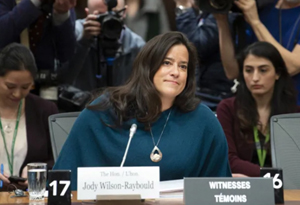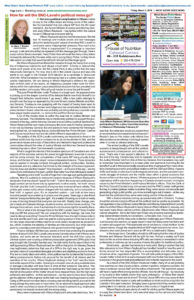
EDITORIAL ~ Posted March 4, 2019 ~ VANCOUVER ISLAND.
by Mary P Brooke ~ West Shore Voice News
Not every political complication in Ottawa makes its way to the coffee shops and living rooms of the nation. But the bombshell that one Liberal MP from the BC lower mainland – the former Minister of Justice and Attorney General Jody Wilson-Raybould – has ignited within the Liberal house in Ottawa has everyone talking.
Wilson-Raybould said she had felt pressured. She felt that 10 meetings and multiple emails and text messages about the ‘protecting jobs’ aspect of sending SNC-Lavalin to court were undue ‘inappropriate’ pressure. How much is too much? What is inappropriate? If a message is important enough, it will (and should be) be repeated until the message gets through. Here’s a pop-culture literary example: Harry Potter fans will recall the many many letters incessantly delivered by the wise white owl to young Harry Potter, inviting him to take action on a fate that would benefit both himself and the larger good.
Ms Wilson-Raybould has filtered her remarks through her being from a long line of indigenous matriarchs and ‘always a truth-teller’. A family or cultural tribe needs such power at its core. But the Liberal Party is also a tribe that she says she proudly belongs to. For now, she is still in the Liberal Caucus and says she wants to run again in the October 2019 election as a candidate in Vancouver Granville. What Canadians may be witnessing here is a culture clash with macrocosmic implications. We are seeing in Wilson-Raybould’s defiance the rugby-style on-field clash of two teams, as indigenous peoples make room for themselves within the mainstream corporate/political structure that has prevailed and built the modern civil society. Who will push harder to move the ball forward?

This puts Prime Minister Justin Trudeau in a tough spot. He appeared slow in picking up on the deeper currents of this debacle that he now finds himself in (or thought that deflection would make it ‘go away’). After a few public attempts to smooth over the long-run approach by his (now former) Justice Minister and Attorney General, Trudeau is now grappling with the impact of having been seen to ‘demote’ her. That she is a woman and indigenous has complicated matters for the prime minister’s brand, when he was probably just doing what any corporate-style team-player leader would do, i.e. remove the wolf from the hen house.
A lot of this trouble does lie within the dual-role of Justice Minister and Attorney General. The ministerial role is intentionally partisan to support the government of the day, yet the Attorney General is to act without political interference. Wilson-Raybould has now made a strong by-the-book case for feeling “pressured” in her role as Attorney General. But she seems to have contained her thinking to wearing that hat, not realizing that as Justice Minister her Prime Minister, Cabinet and Caucus would have had and did exhibit different expectations of her.
The politics of this SCN-Lavalin controversy are important to those in the political world (how big must a company be so as not be allowed to fail), and the governance issues are a topic of fascination and debate for legal and professorial communities (should the roles of Justice Minster and Attorney General be separated as they are in other Commonwealth countries).
What’s caught the interest of the broadest spectrum of Canadians are other aspects of this scenario, namely the power struggle between a woman in caucus and her prime minister, the complexities of that same MP being proudly indigenous, and the test of ‘team player’ versus independent stance. These dynamics can be applied in broader contexts throughout politics, communities, families, businesses and any collective that thrives by the strength of the team approach. How far does one test their leader? How important – at the end of the day – are the views of one individual on the team, and for that matter how that individual is treated?
“Speaking one’s truth” is a bit of lingo from new age and spiritualist-based cultures. Now it’s suddenly in everyone’s lexicon because of Wilson-Raybould’s declaration that she should “speak her truth”. Truth in the social and political (even legal) context can be found only by agreement; in other words, ‘her truth’ versus ‘his truth’ plus the ‘truth’ (viewpoint) of anyone else involved all have validity. That jumble gets sorted out by others charged with that authority, and a composite or final ‘truth’ is agreed upon. It’s an imperfect system – just look at how many innocent people have ended up in prison over the years. Years ago a wise friend told me “everyone thinks they are right”. It’s a matter of sorting out a truth or reality or way of moving forward that everyone can live with. Reality does change, people’s needs and interests change, situations evolve, and time moves us along. The stronger force will win, even if sometimes it’s not the more rightful or worthy force.
Who or what is the stronger force in the SNC-Lavalin mess? Does it matter that one MP felt pressured? We can empathize with the feelings, but does that need to disrupt everything? Does the Prime Minister have the right to keep order in the rank and file (and if yes, aren’t we glad for a strong person in that role to do so)? Do very large corporate entities need to be more clearly recognized as job-providers, which underlies the stability of families and the economy (but what reach is given to corporate power and influence over government in that regard)?
Finance Minister Bill Morneau seems to think that protecting the possible demise of about 9,000 SNC-Lavalin jobs across Canada (about half of those are in Quebec, and some are on Vancouver Island) is worth the shift from using the criminal system over to using a deferred prosecution agreement (DPA) option that was brought into Canadian law last year. He told media that he saw no fault in his staff approaching Wilson-Raybould and her staff on that point. An Attorney General may legitimately determine that use of a DPA is the right way to go, given the complex nature of corporations being job-providers and stabilizing economic forces. The law is mostly black-and-white, while politics has the fundamental function of taking socioeconomic factors into account for the benefit of all citizens and the operation of the country. Wilson-Raybould sticking to her ‘truth’ was the black-and-white aspect of the matter. Opening to a broader view of using available tools to manage a situation with less harm is what all that ‘pressure’ was about. Yes, the former Attorney General had said ‘no’ and that she “had made up her mind” and she felt all discussion of the matter should have stopped there. But the high-level politicians and staffers – in their persistence – can be seen to have been trying to get the attention of the engineer as the train was heading headlong toward a crash. Using a DPA would not mean that a company was not being held to account for the wrong-doings they were seen to have done; it is an alternative legal approach (also used in other countries) to stave off economic impact to persons (e.g. employees, pensioners) not directly involved with the wrong-doing.
Many were impressed with Wilson-Raybould’s articulate testimony. Yes, it was that. But what else would you expect from an accomplished and experienced prosecutor? People’s awe on this matter only reflects how little excellence we witness in the legal system when it comes to witness testimony.
This entire handling of the SNC-Lavalin scenario is deeply fraught with all this political, socioeconomic consequence, and cultural nuance. That’s why it has people’s attention. At the end of the day, Canada may wish to separate ‘church and state’ by splitting the Justice Minister role from that of Attorney General. And Canadians may wish to remember how important it is to keep order and teamwork humming for the benefit of us all in this economically precarious time of upheaval from many directions (including economic and political relations with the USA and China, massive shifts and losses in jobs due to technological advances, and the persistent economic struggle of workers and the middle class within a global economy that favours a few over the many others). Whatever pressure it took to try and keep a calamatous shift in jobs from happening in Canada showed concern of a higher nature by the Prime Minister’s and Finance Minister’s offices. That the Clerk of the Privy Council (Canada’s top civil servant) and the PMO’s senior staff got into the fray in a rather partisan matter is another thing; when senior civil servants start generating a high public profile, you know something is out of whack – at the very least that the politicians they serve were losing control of the situation.
With a federal election coming up (presumably still in October), Trudeau should be actively trying to diffuse all this political heat as quickly as possible. He had appointed a new combined Justice Minister and Attorney General (David Lametti) when he shifted Wilson-Raybould to being Veteran Affairs Minister in January, and last week made three cabinet portfolio adjustments after Wilson-Raybould quit cabinet altogether. But so far there hasn’t been any proactive explanatory leadership demonstrated directly to Canadians – a fire-side chat, if you will.
Stirring up all this mess puts re-election challenges upon Wilson-Raybould. Just because she wants to run again doesn’t mean her fellow party members and/or voters will support her. Philosophically she is not likely to ‘cross the floor’ to the Conservatives, though the depleted federal NDP might welcome her verve. Constituents who vote Liberal won’t want an MP who is sidelined in Ottawa.
In the longer term, Canadians should be left hoping that the roles of Justice Minister and Attorney General will be split into two. And as a society we’ll look back on this as a time where including MPs who are trained or enmeshed in other professions or cultures can be a source of some disruption for traditional politics.
Great news… gender has become a moot point. Being a woman has had little relevance to how Wilson-Raybould has handled herself or how the swirl of forces around her has responded She is accomplished and articulate, but so should we all be, regardless of gender. The soft-side political legacy of this SNC-Lavalin matter is that all of us were impressed with how the bar has been raised for everyone in the government and parliament who’s had to respond to this event.
As a result of the SNC/Wilson-Raybould matter, many of us will probably now examine our view of party politics, women in politics, indigenous politics, the roles of politician versus staff, and the ethos of teamwork. The teamwork aspect will have a ripple effect among elected officials; how far will they go – by necessity or by loyalty to their beliefs and/or their party philosophy – to follow their leader and support their team and its brand? The few Liberal MPs who may waver in their commitment to their leader or party will contribute to what could be a big hit to the Liberals in this year’s election. Bringing down a government they worked hard to participate in is irrational, and disruptive to this country in fragile times.
Wilson-Raybould gets plenty of credit for stirring up the Ottawa apple cart in a way few others have done. Let’s see what stays on the cart and who falls by the wayside.
~ MPB
As first published on page 2 in the March 1, 2019 issue of West Shore Voice News


